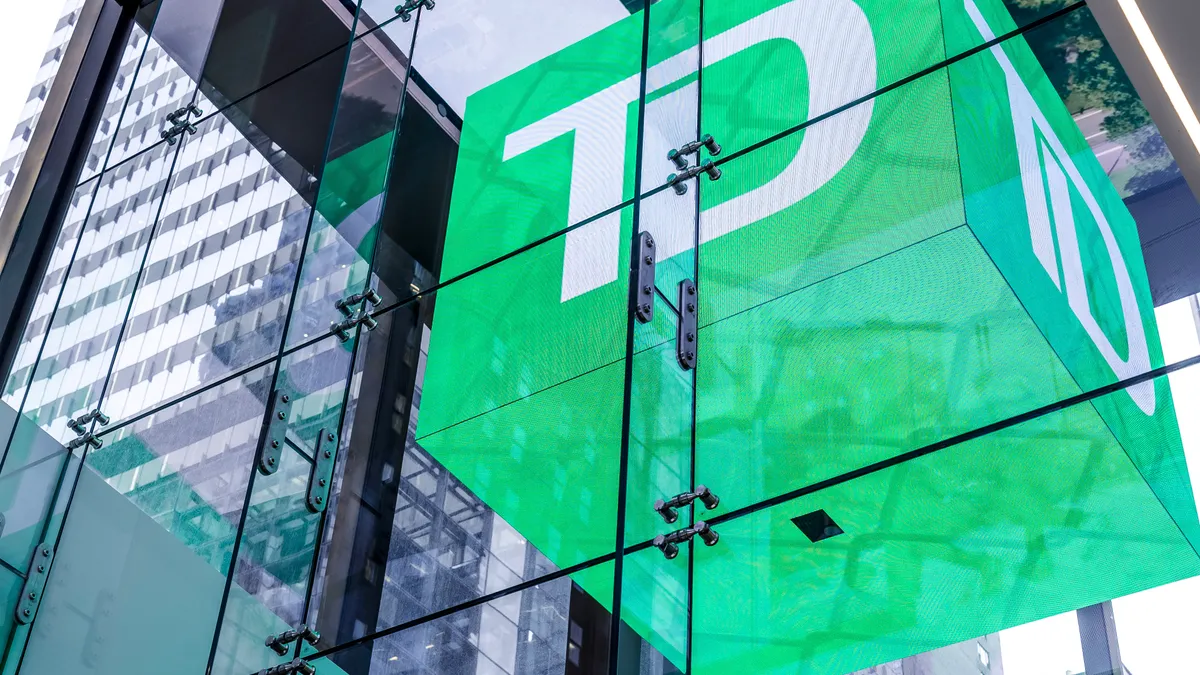TD executives knew as early as November 2022 — six months before the bank’s $13.4 billion proposed acquisition of First Horizon was terminated — that multiple U.S. agencies, including the Justice Department, had found anti-money laundering deficiencies serious enough to put the deal at risk of rejection, the Capitol Forum reported Monday, citing two sources familiar with the matter.
Investors have waited months for TD to give further details surrounding the AML woes that had been rumored as the catalyst behind the deal’s collapse since the week of the termination itself.
TD disclosed in its August earnings report that it is cooperating with a DOJ investigation into the bank’s compliance with AML measures but has given little assurance since.
“The bank anticipates monetary and/or non-monetary penalties to be imposed” as a result of the AML matter, TD said in the earnings report, adding that it is “pursuing efforts to enhance” its Bank Secrecy Act compliance program.
When pressed during the accompanying earnings call, TD CEO Bharat Masrani told analysts the bank is “working hard to enhance our programs.”
Masrani added that he could not comment on regulatory matters but that the bank would update shareholders when more concrete figures arise.
Other TD executives, meanwhile, refused to tip their hand.
TD is “ensuring that we’ve got a strong control platform to be able to operate,” Leo Salom, the bank’s U.S. CEO, said on the same call. “Governance and control is one of our important elements and pillars of our overall investment process.”
At a conference the following month, Salom called the DOJ investigation a “manageable item,” adding that “in the fullness of time we will be able to resolve [it].”
When asked more recently for an update, Lisa Hodgins, a TD spokesperson, told The Globe and Mail the bank “has rigorous processes in place to ensure disclosure of information consistent with our disclosure and contractual obligations.”
“Our public statements updated the market as matters evolved,” Hodgins told the publication. “At all times, TD acts in the best interests of the bank and our shareholders.”
Some investors on the other side of the foiled transaction have been less patient with TD. The Arbitrage Fund, a First Horizon shareholder, sued TD in May, alleging the Canadian lender made a series of misleading statements regarding its AML practices and the projected timeline for completion of the deal, while downplayed regulators’ resistance to the proposed tie-up.
TD, in response, leaned in to the narrative that its “public disclosures are accurate.”
The lawsuit cited reporting from The Wall Street Journal that found TD had flagged just 28 customer transactions as suspicious “in recent years” — and asserted that the bank’s handling of suspicious customer transactions spurred the Office of the Comptroller of the Currency and the Federal Reserve’s delays in giving the First Horizon deal a green light.
As for this week’s report that TD executives may have known of AML probes long before the First Horizon deal’s collapse, it would not be the first time the Capitol Forum has been cast as a spoiler for the Canadian bank.
In urging the OCC to block the First Horizon deal in June 2022, Sen. Elizabeth Warren, D-MA, cited a Capitol Forum report that alleged TD incentivized its employees to enroll customers in new accounts and services like overdraft protection without their consent.
The OCC investigated TD’s practices after Wells Fargo’s 2016 fake-accounts scandal surfaces, the Capitol Forum reported at the time. Warren, however, alleged the regulator “swept it under the rug” under the leadership of Trump appointee Keith Noreika.
Since the TD-First Horizon tie-up collapsed, each of the lenders has laid out plans to expand in the Southeast U.S.
First Horizon CEO Bryan Jordan said in June his bank aims to “build a banking franchise in the South that is going to be unparalleled,” adding that the Memphis, Tennessee-based lender has “hit the ground running.”
TD, meanwhile, wants to open 150 new U.S. branches by 2027 but is specifically targeting markets such as South Florida, Atlanta and North Carolina.
The Justice Department in October charged former TD employee Oscar Marcelo Nunez-Flores with allegedly helping to create shell companies and issuing dozens of debit cards, allowing individuals in Colombia to withdraw laundered money. However, it is unclear whether the case is related to the DOJ AML probe TD disclosed in August.
“In respect of the recent charges of a TD branch employee in New Jersey, TD is cooperating fully with the law enforcement and this employee has been terminated,” Hodgins said in October in a statement to The Globe and Mail.






















